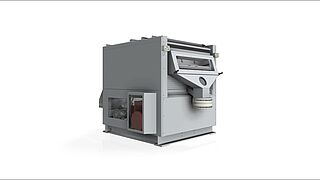Separating table process for tea production
A cup of tea is an outstanding taste experience, because depending on the type and variety, this drink develops very different aromas, each of which leads to a unique enjoyment. Tea can also have an invigorating effect and ensure a pleasant start to the day. Tea is one of the most popular drinks, especially in winter, and we benefit from the fact that it gives us a pleasant warmth. All of these properties and benefits make tea extremely popular. Statistics show that the inhabitants of Germany drink around 129 million cups of tea per day. That's a little more than one and a half cups per inhabitant. The annual per capita consumption in 2019 was around 68 liters. These figures not only include tea from the tea plant, but also other infusions - so-called herbal and fruit teas. Impressive numbers, but in many countries the consumption of tea is even higher. Turkey is at the forefront. Every resident there bought an average of 2.7 kg of tea in 2020. In second place is Brazil with a per capita consumption of 2.4 kg. Only in third place is the tea's country of origin: China. Here the consumption was 1.39 kg.
The processing of the tea
In order to be able to enjoy the tea, several processing steps are usually necessary. The classic procedure comprises five phases. In the beginning there is wilting. The freshly picked tea leaves are lightly dried to reduce the water content. This is followed by rolling, during which the cells of the leaves are broken open and the cell sap can escape. The next step is fermentation. The ingredients of the tea leaves oxidize and the intensity of the fermentation process determines which type of tea is produced. For example, green tea is not fermented at all, while black tea is completely fermented. The final steps are drying and sorting or refining the tea.
Tea production in Germany
The processing steps described must usually be carried out immediately after the harvest. Therefore, they usually take place in the countries of origin. The most important tea producers in the world are China, India and Kenya. In the last few years the demands on food hygiene and processing by consumers have steadily increased, which has led to the fact that the last steps in tea production / processing are increasingly taking place in Germany and in many other European countries. Many companies import the loose tea from the countries of origin in order to then carry out the further processing and packaging themselves with modern processing plants in Germany. In addition, there is the production of herbal and fruit teas, which are mainly made from local plants. Here the manufacturers produce these products themselves on site.
Foreign substances in tea - a common problem with further processing and refinement
When processing the tea, there is often the problem that it contains numerous foreign substances. These impurities can seriously affect the quality of the end product. In order to make a high-quality tea, it is therefore important to completely remove all foreign substances before further processing.
Separation of foreign bodies - purest tea enjoyment
The TTS cutting table from TRENNSO-TECHNIK® is ideal for achieving reliable and efficient separation of foreign bodies. This automatically distributes the raw materials on a working sieve. This is moved by an eccentric motor and a fan also generates a strong air flow. In this way the ingredients are separated from each other. This process is very reliable and thus ensures an exact separation. The result is a pure, high quality tea. In addition, this process runs very quickly and thus contributes to an efficient production process.
TTS cutting table: Can also be used for other foods and as a recycling machine
The TTS cutting table is ideal for processing tea. In addition, however, it offers many other possible uses. You can use it for numerous other foods - such as spices or cocoa beans. It also serves as a recycling machine. You can use it to remove foreign substances from old glass or wood, for example, and sort electronic waste and various metals.
Inquiries about sorting technology? Call TRENNSO-TECHNIK®!
If you have any inquiries about sorting technology such as our screening technology or density sorting technology, we would be happy to provide you with information about our machine portfolio. Special feasibility inquiries can actually be carried out through tests in the TRENNSO-TECHNIK® technology center in Weißenhorn. After making an appointment in advance, our trained team in the technology center is happy to help you.
We look forward to your task: Tel. + 49-7309-9620-0




